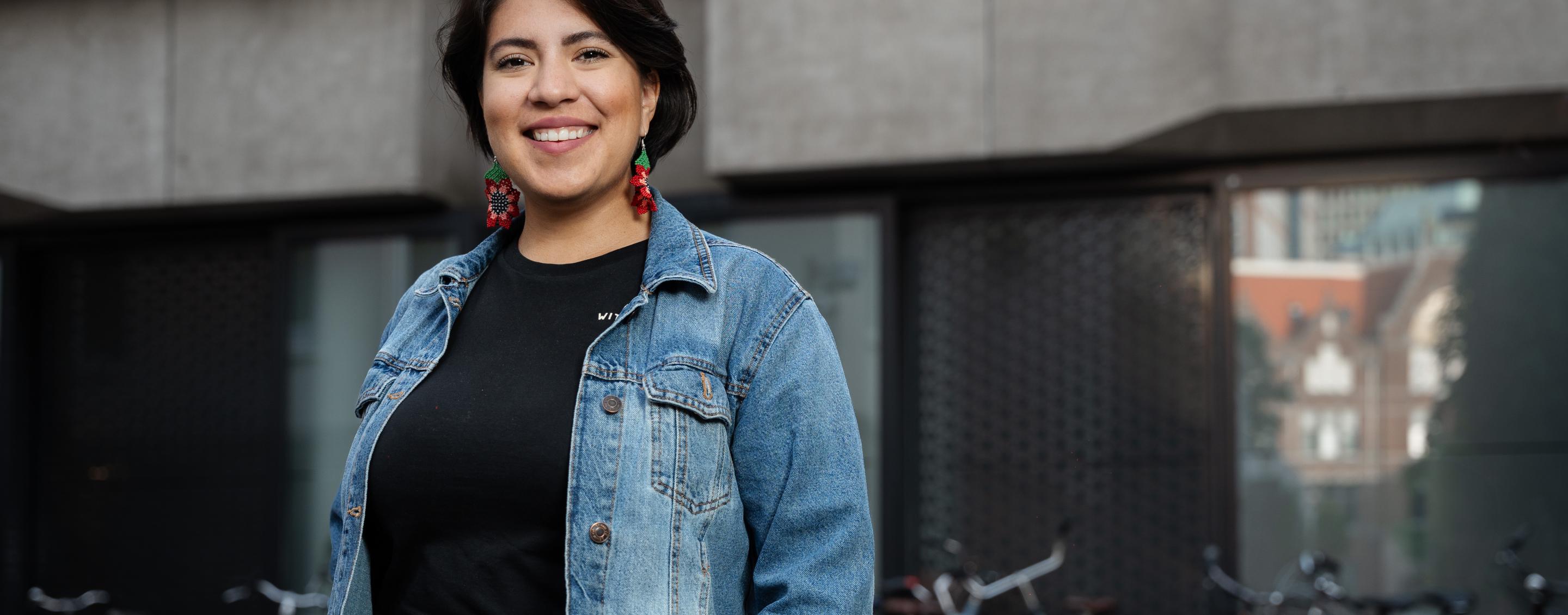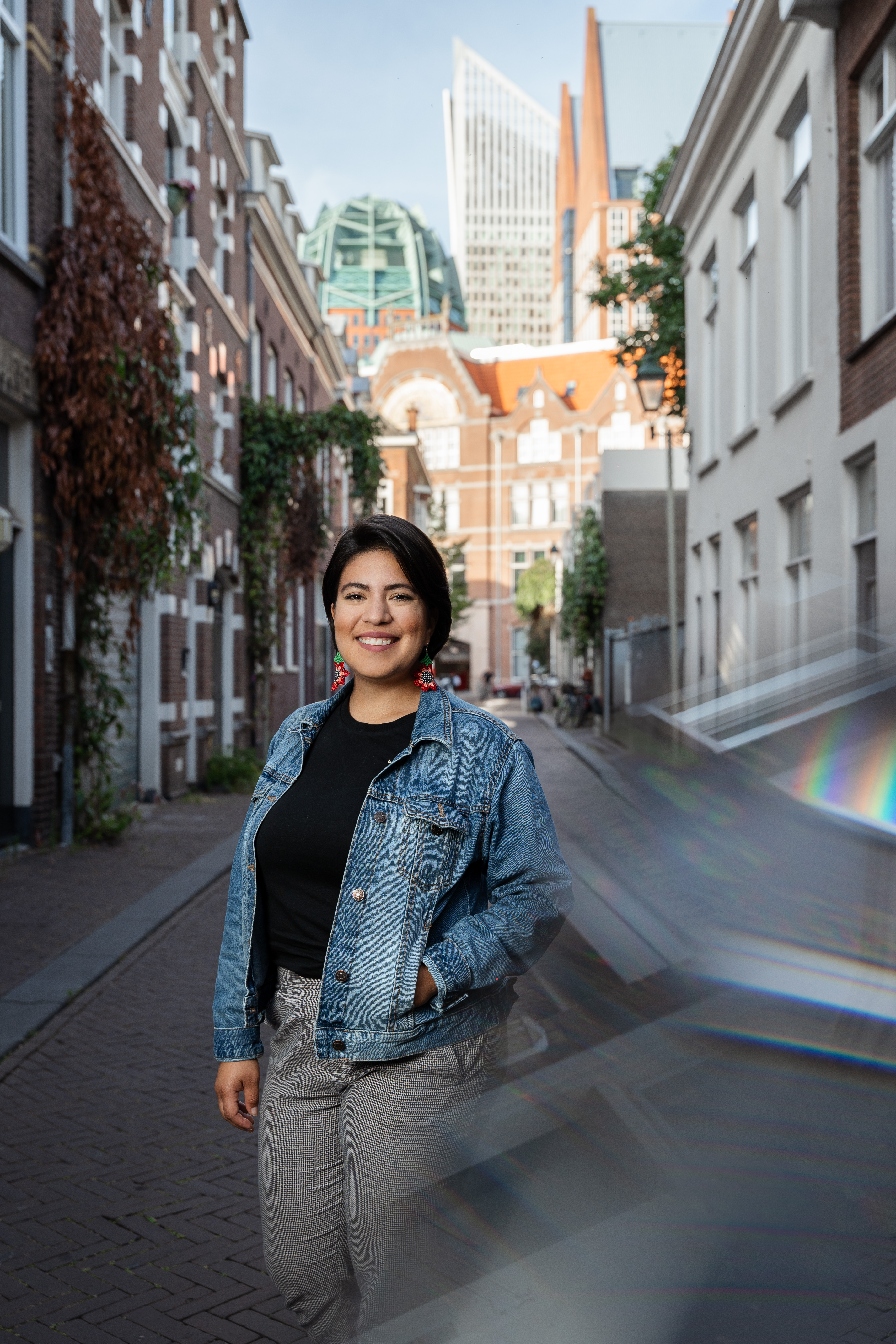
Mariana Pérez Contreras: From Mexico City to Leiden, I Found Space to Breathe
A shift from energy to calm
For Mariana Pérez Contreras, moving from the endless energy of Mexico City to the calm rhythm of Leiden in the Netherlands felt like stepping into another world. She arrived in February, to cold winds, grey skies, and streets filled with cyclists instead of buses and cars. At first, the quiet felt overwhelming, but the beauty of the city drew her in. “The architecture, the history, the way people move, it felt like I had space to breathe for the first time,” she says.
Designing better human experiences
Her move to the Netherlands came just one month before the pandemic lockdown began, an unexpected twist for someone starting a new life abroad. She had relocated with her husband to study a master’s degree in Design for Interaction at TU Delft, building on her background in industrial design and marketing. “I used to design products and spaces that looked beautiful,” she explains. “But I wanted to do more than make things nice. I wanted to design for people, to make their interactions with services and systems smoother and more human.” Her work now focuses on improving the invisible touchpoints of everyday life, like simplifying student sign-up processes or redesigning surveys so users feel supported instead of frustrated.
“When you pay attention to the little interactions, you can change how someone feels about their day. That is the part of design that excites me most.”
Finding her place, one bike ride at a time
Her first months in The Hague were defined by isolation, but also by discovery. With museums, restaurants, and cultural events closed, Mariana spent hours cycling and walking through the city. “I would get lost on purpose, exploring the old buildings, the canals, and the way history feels alive here,” she says. “Coming from a city of concrete and constant movement, it was like finding another rhythm.” Her bike quickly became her sense of freedom. “In half an hour I can cycle to the ocean. I can visit another city on the same day. The infrastructure here lets you claim your time in a way that was impossible back home.”
A region built on collaboration
Mariana's career is a prime example of how closely connected the cities in South Holland are. While she lives in Leiden, just 15 minutes by train from The Hague, and works in Delft, less than 20 minutes away, she actively collaborates with The Hague International Centre to support international students beyond the classroom. At TU Delft, Mariana works as a Business Relations & Communication officer helping companies and students connect after their graduation. This work becomes especially valuable for international students in STEM, many of whom are looking to stay in the Netherlands after finishing their degrees. “I work with companies based in The Hague, and we are always sharing best practices and strategies to support people who are new to the Netherlands or want to stay longer term,” she says. That regional dynamic, living in one city, working in another, collaborating with a third, is common for many internationals, and Mariana sees it as a strength of the region.
Comfort through culture and community
The Hague’s international character helped her adjust more quickly than she expected. On trams and in cafés, she often hears Spanish, meeting people from across Latin America and Spain. “It was comforting, especially during lockdown, to know there were people nearby who shared my language and culture,” she says. “And when I miss home, I can go to a Mexican restaurant and feel connected for a moment.”
“Freedom for me is being able to step outside, get on my bike, and decide my day. That is something I never thought I would have living in Europe.”
Dutch winters, sweet treats, and new traditions
Mariana has embraced Dutch traditions in her own way, especially those that make the colder months feel warmer. She calls herself a sweet tooth and happily admits that winter treats like pepernoten, salted caramel Kruidnoten, and stroopwafels are her favourite Dutch indulgences. She has also adopted words like gezellig, which she now uses with her colleagues whenever they share lunch or a moment of laughter. “In Mexico, life feels like a constant rush from one thing to another,” she explains. “Here, people make time for comfort and small joys, and I have learned to do the same.”
Celebrating life in a new country
She has grown fond of Dutch celebrations too. Sinterklaas is one of her favourites, not because she grew up with it but because she enjoys watching how it brings people together. “Seeing the children light up when Sinterklaas arrives by boat and hearing the songs in the streets makes me smile, even if it is freezing outside,” she says. She also looks forward to Open Monument Day in September, when historic buildings across the country open to the public. “It is a beautiful way to explore places you would never see otherwise.”
Creating smoother landings for others
Mariana’s relationship with The Hague International Centre began through her work at TU Delft, where she helps students navigate their careers after graduation. She now collaborates with the Centre to connect students who want to stay in the region with resources, employers, and networks. “I did not have much support when I first arrived because everything shut down so quickly,” she says. “That is why it feels important now to help others have a smoother experience. The Centre gives people a place to ask questions, join events, and feel like they are not alone.”
Slowing down without missing out
For Mariana, The Hague is where she found space to slow down without losing her connection to the world around her. It is a city where history, modern life, and international culture meet, giving her room to build a career, explore, and feel at home. “Coming from Mexico City, I never imagined I could live somewhere this open and balanced,” she says. “Now, I know I came to the right place.”
The Hague International Centre 15 Year Anniversary
If you are new to The Hague, supporting newcomers, or simply curious about what makes this city so international, visit the The Hague International Centre. Whether you are looking for information, inspiration, or collaboration, it is the place to start. Over the past 15 years, the International Centre has welcomed 60.000 internationals from all walks of life, each bringing their unique perspectives and experiences.

